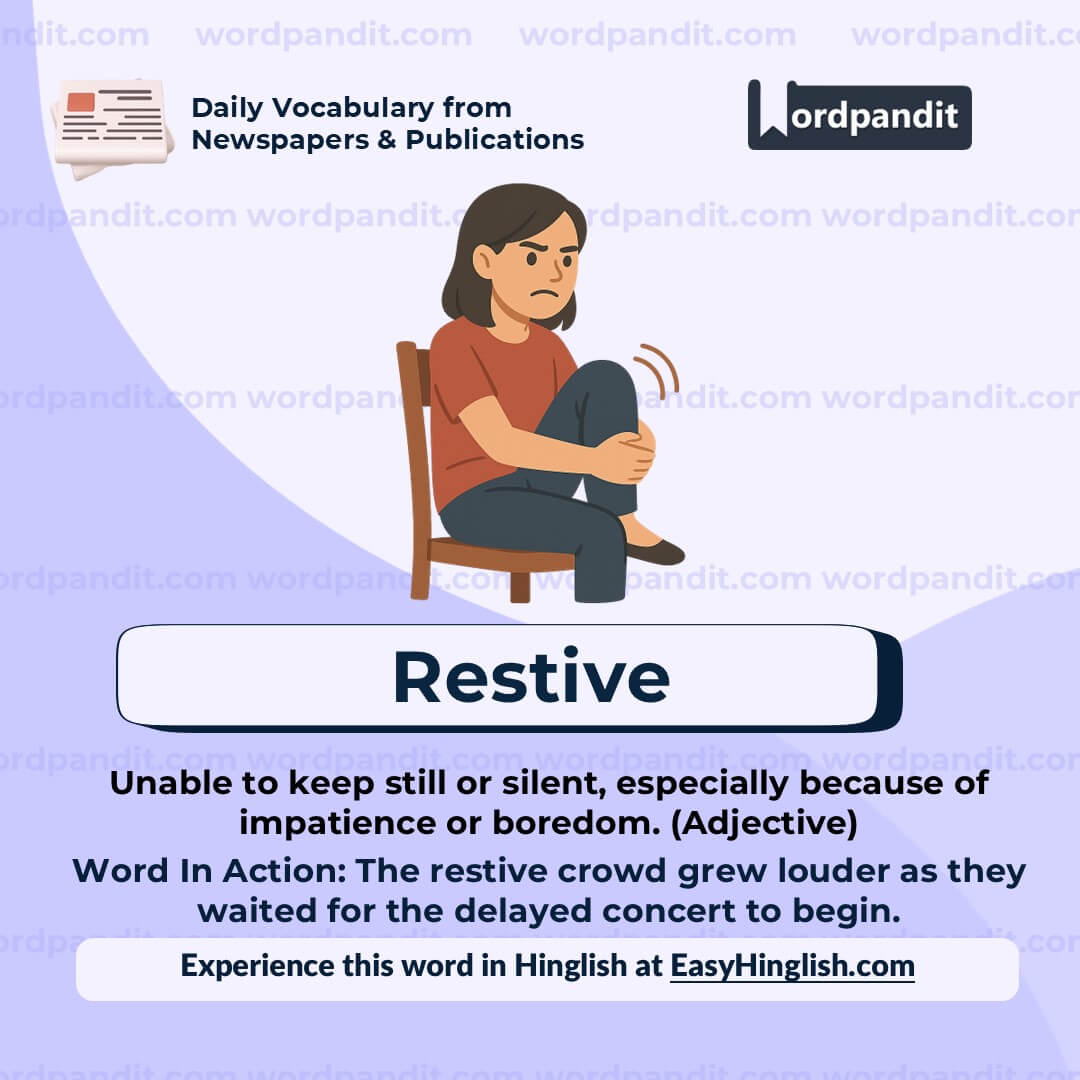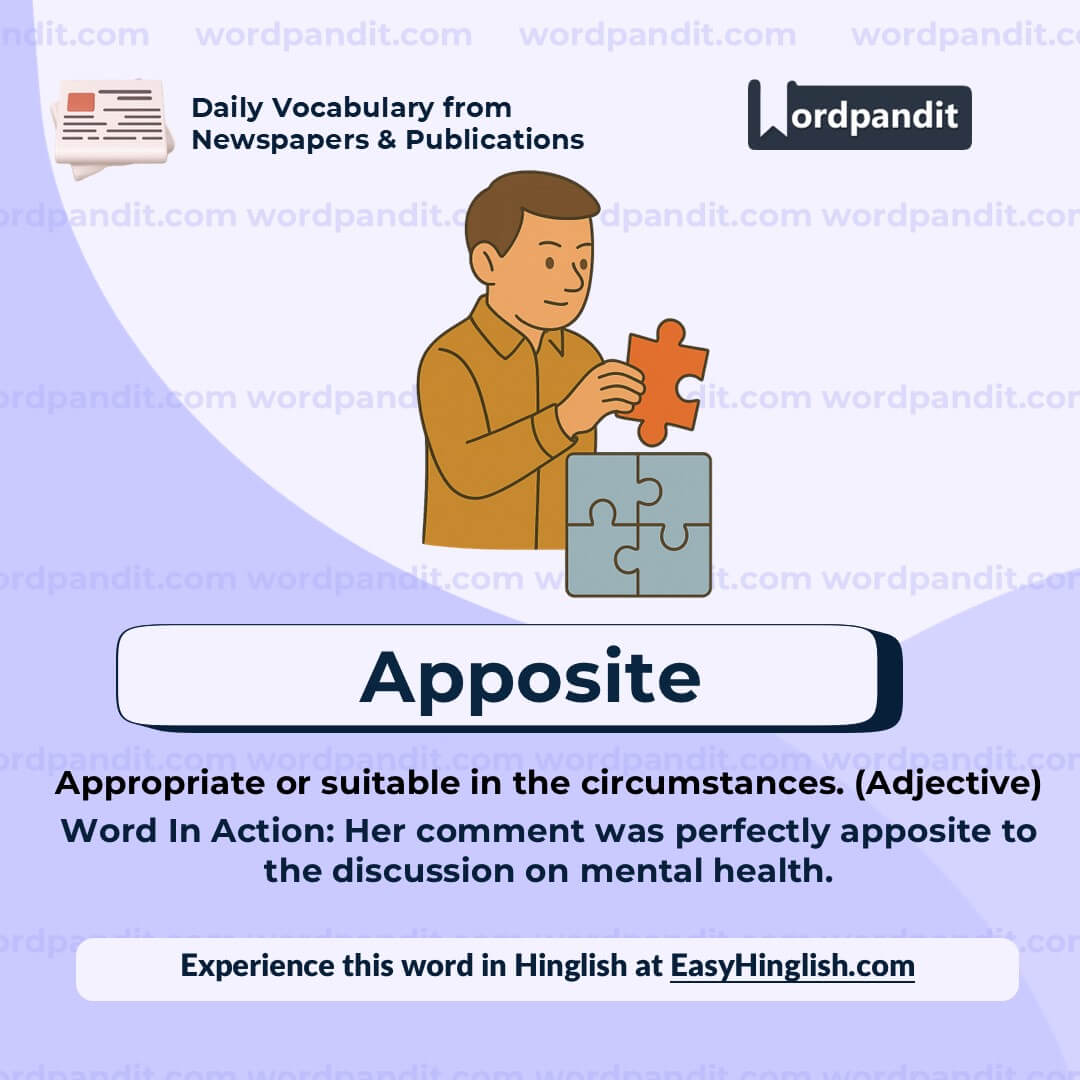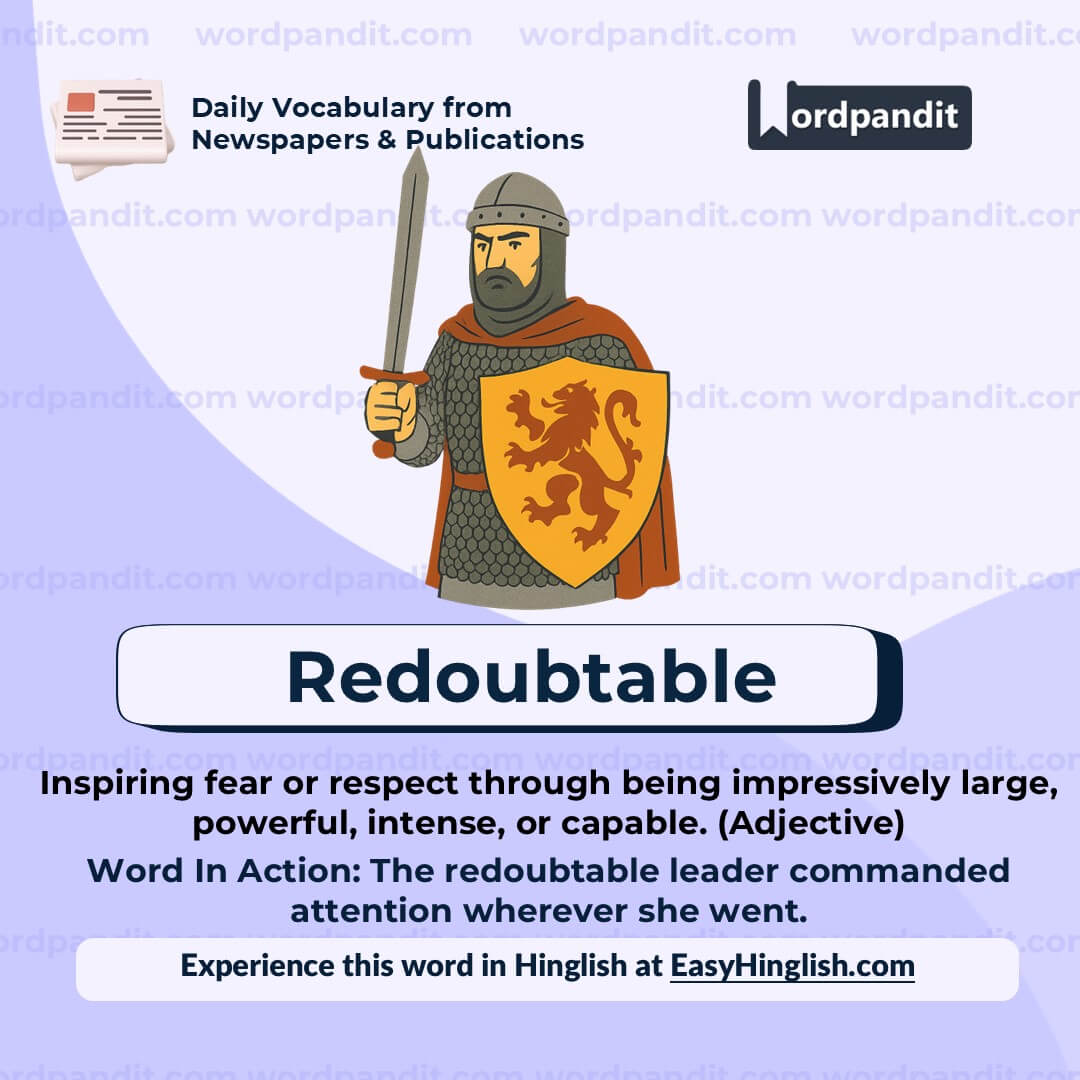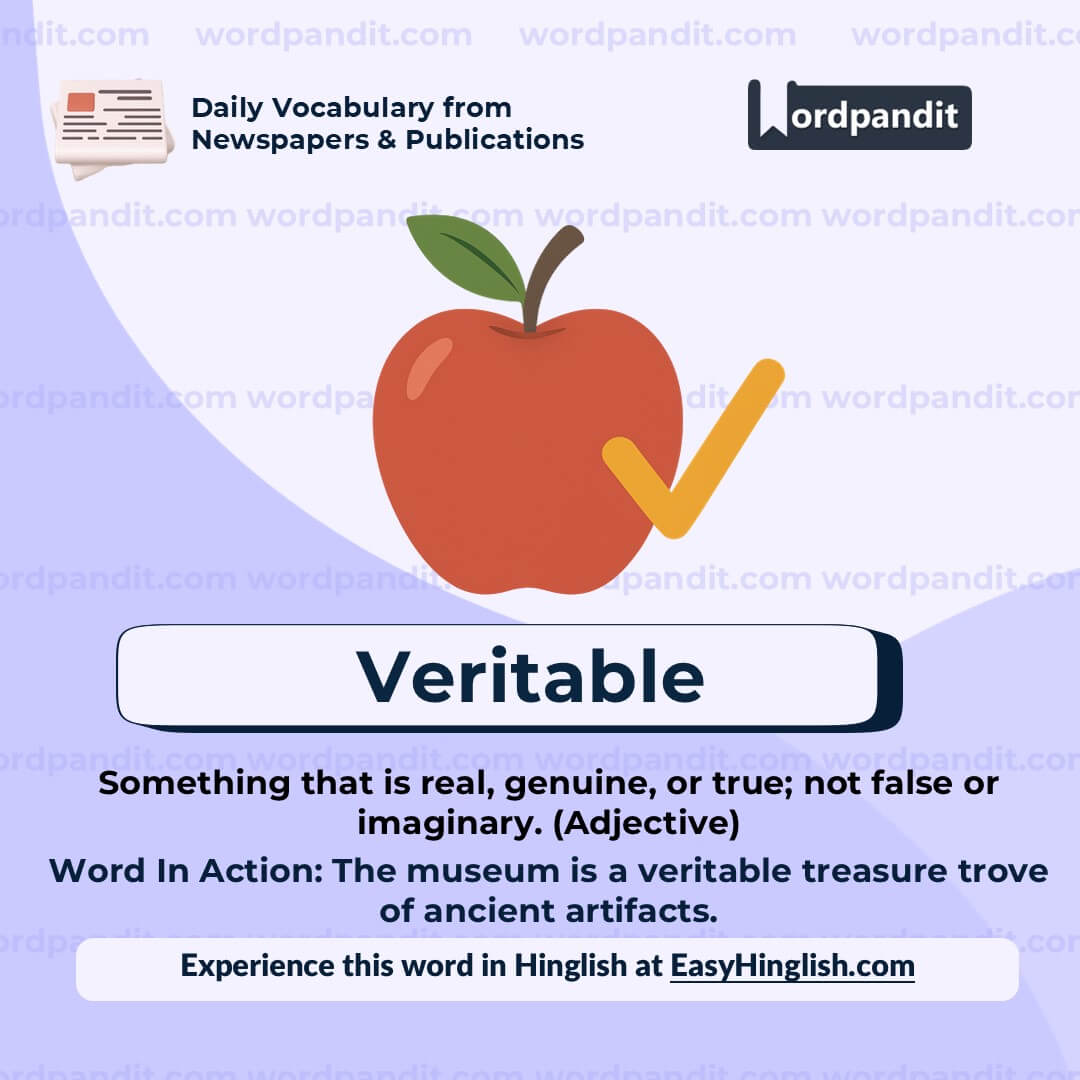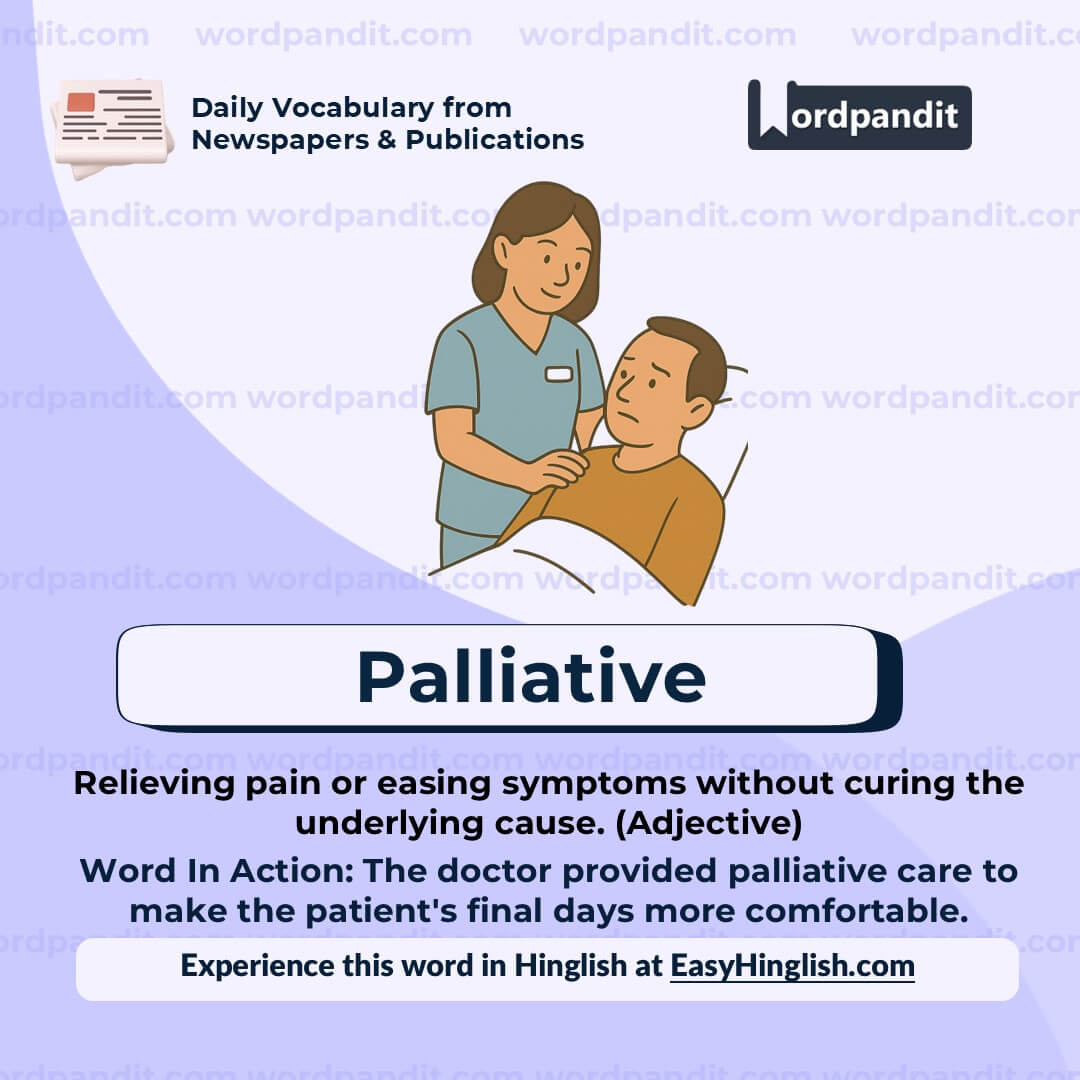Daily Vocabulary from Indian Newspapers and Publications
Welcome to Wordpandit’s Indian Vocabulary Hub
At Wordpandit, we understand the importance of staying rooted in the local context while expanding your language skills. This section focuses on enriching your vocabulary with words and phrases drawn from India’s leading newspapers and publications, ensuring you're learning vocabulary that is practical, relevant, and uniquely Indian.
Why Indian Sources Matter
We believe that the best way to master any language is by immersing yourself in local content. That’s why we carefully curate vocabulary from top Indian publications, including:
- The Hindu
- The Times of India
- The Economic Times
- Hindustan Times
- Live Mint
- The Indian Express
- And many others...
Stay Updated, Stay Relevant
With daily updates from Indian news sources, you’ll be consistently learning words that reflect the trends and shifts in Indian society and culture. Our focus is to provide vocabulary that enhances your understanding of the language in an Indian context.
How Wordpandit Supports Your Goals
Whether you’re preparing for exams, aiming to improve your professional communication, or simply want to stay connected with the latest Indian vocabulary, Wordpandit is here to guide you every step of the way.
Learn with a Practical Approach
Our interactive learning methodology includes real-world examples, engaging activities, and context-specific usage to ensure that every word becomes part of your active vocabulary.
Dive into Indian Vocabulary Today!
Why Choose Wordpandit?
Practical Learning: Focus on words you'll actually encounter in real-world reading, enhancing your comprehension and communication skills.
Diverse Content: From current affairs to scientific breakthroughs, our varied sources expose you to vocabulary across multiple domains.
Effortless Integration: Make Wordpandit a part of your daily routine. Just a few minutes each day can significantly boost your lexicon over time.
Your Path to Vocabulary Mastery
- Visit our Daily Vocabulary section regularly
- Explore new words and their usage in context
- Practice incorporating these words into your own writing and speech
- Track your progress as your vocabulary expands
Start Your Journey Today
Embark on your vocabulary enhancement journey with Wordpandit. By consistently engaging with our daily posts, you'll build a robust vocabulary that serves you well in academic, professional, and personal contexts.
Remember, a word a day keeps linguistic limitations at bay. Make Wordpandit your daily companion in the quest for vocabulary excellence!
WORD-1: Restive
Context:
"The government faces a restive populace in northeastern states where development promises remain largely unfulfilled." - The Assam Tribune
Explanatory Paragraph:
When people or groups are described as "restive," it means they are becoming increasingly difficult to control, often due to dissatisfaction, impatience, or frustration. This word is often used to describe citizens, crowds, or groups that are growing uneasy or rebellious, especially when progress or promises are lacking. In the context above, "restive populace" refers to people in northeastern India who are becoming agitated due to unmet development expectations.
Meaning: Unruly, impatient, or difficult to control due to dissatisfaction (Adjective)
Pronunciation: RES-tiv
Difficulty Level: ⭐⭐⭐ Intermediate
Etymology: From Latin "restare" meaning "to remain behind," later evolving in usage to mean resistant or uneasy in English by the 15th century.
Prashant Sir's Notes:
Commonly confused with "rest" or "restful" due to similar appearance, but "restive" actually implies agitation, unease, or resistance. Think of a horse refusing to move forward or a crowd getting uneasy—both are restive situations. It’s a great word to describe subtle rebellion or building impatience.
Synonyms & Antonyms:
Synonyms: agitated, unruly, impatient, uneasy, defiant
Antonyms: calm, obedient, content, submissive, peaceful
Usage Examples:
- The restive employees staged a protest over delayed salaries.
- She grew restive during the long, unproductive meeting.
- Despite the security presence, the crowd remained restive.
- The leader tried to calm the restive community with promises of reform.
Cultural Reference:
"Restive crowds are often seen in protest movements across the world, from the Arab Spring to recent climate marches." - Observation from global news patterns
Think About It:
What factors usually contribute to a group or society becoming restive, and how can leaders address this unrest effectively?
Quick Activity:
Write 3 short sentences describing restive situations in daily life—one at school, one in traffic, and one during a meeting.
Memory Tip:
Think of "restive" as the opposite of “resting”—when you *can’t* rest because you're too agitated or upset!
Real-World Application:
"Restive" is often used in political journalism, sociology, and business management to describe people or situations that are becoming hard to control due to dissatisfaction—such as restive voters, restive shareholders, or a restive workforce.
WORD-2: Apposite
Context:
"His remarks were particularly apposite given the recent developments in bilateral relations between the neighboring countries." - Dainik Bhaskar
Explanatory Paragraph:
The word "apposite" is used to describe something that is highly appropriate, fitting, or relevant to a particular situation or context. It’s often used in discussions, speeches, or writing to praise a comment, example, or reference that perfectly matches the topic at hand. In the given context, the speaker’s remarks were not just timely but also very relevant to the evolving political situation between the countries.
Meaning: Highly appropriate or relevant; suitable for the situation (Adjective)
Pronunciation: AP-uh-zit
Difficulty Level: ⭐⭐⭐ Intermediate
Etymology: From Latin "appositus," past participle of "apponere" meaning "to place near or beside."
Prashant Sir's Notes:
Don’t confuse "apposite" with "opposite"—even though they look similar, they have very different meanings. "Apposite" means relevant or appropriate, while "opposite" means completely different or contrary. It's a good word to use when you want to highlight how well something fits into a conversation or situation.
Synonyms & Antonyms:
Synonyms: relevant, appropriate, apt, fitting, suitable
Antonyms: irrelevant, inappropriate, unsuitable, off-topic
Usage Examples:
- Her comment about resilience was apposite during the crisis management meeting.
- The documentary provided apposite examples to support its thesis.
- The professor's analogy was both humorous and apposite.
- He offered an apposite quote from Gandhi to close his speech.
Cultural Reference:
"In debates and essays, an apposite reference to a well-known personality or event often strengthens the argument." - Academic Writing Tips Journal
Think About It:
Can you recall a time when someone said something that was so perfectly timed and relevant it made the moment unforgettable? What made it so apposite?
Quick Activity:
Think of a current news story and write one apposite quote or comment that could be used to explain it better.
Memory Tip:
Apposite is “a+positive” — think of it as a “positively appropriate” comment!
Real-World Application:
Writers, journalists, and public speakers frequently use apposite references to make their points more compelling. Using apposite quotes in essays or reports can significantly boost clarity and impact.
WORD-3: Redoubtable
Context:
"This redoubtable activist has spent decades fighting for tribal land rights despite facing threats and political pressure." - People's Archive of Rural India
Explanatory Paragraph:
"Redoubtable" is a word used to show deep respect, admiration, and even a bit of fear toward someone who is strong, determined, or formidable in character. It often describes individuals who command respect because of their bravery, persistence, or achievements. In the context above, the activist is described as redoubtable because of her unwavering commitment to tribal rights, despite the many dangers and obstacles she has faced over the years.
Meaning: Formidable and worthy of respect or fear; commanding admiration (Adjective)
Pronunciation: rih-DOW-tuh-buhl
Difficulty Level: ⭐⭐⭐⭐ Advanced
Etymology: From Old French "redoutable" meaning "to be feared," from Latin "re-" (again) + "dubitare" (to doubt, be afraid).
Prashant Sir's Notes:
This is one of those elegant words that express admiration with an edge of awe or fear. Use "redoubtable" when someone is not just admirable, but formidable—like a seasoned activist, a brilliant debater, or a fearless leader. It’s especially useful in formal or literary contexts.
Synonyms & Antonyms:
Synonyms: formidable, fearsome, impressive, awe-inspiring, commanding
Antonyms: unimpressive, weak, trivial, insignificant
Usage Examples:
- She is a redoubtable scholar whose research has reshaped modern anthropology.
- Facing the redoubtable opponent in the finals was no easy task.
- The courtroom fell silent as the redoubtable lawyer began her closing arguments.
- History remembers him as a redoubtable freedom fighter who inspired generations.
Cultural Reference:
"Redoubtable figures like Rosa Parks and Nelson Mandela didn’t just resist oppression—they made the world stop and listen." - Commentary from Global Human Rights Symposium
Think About It:
What qualities make someone redoubtable—fearsome, admirable, or both? Can fear and respect coexist?
Quick Activity:
List three people (living or historical) whom you consider redoubtable and explain why in one sentence each.
Memory Tip:
Think: someone “doubtless” to be feared or respected → “re-doubt-able.” If they make you doubt yourself—they’re probably redoubtable!
Real-World Application:
"Redoubtable" is commonly used in journalism, biographies, and formal writing to describe impactful leaders, intellectuals, or activists. It's a strong word that instantly conveys power and respect.
WORD-4: Veritable
Context:
"The ancient manuscript collection represents a veritable treasure trove of historical knowledge yet to be fully studied." - Sahapedia
Explanatory Paragraph:
The word "veritable" is often used to emphasize the truthfulness, intensity, or authenticity of something. It means “real” or “genuine” and adds weight to a description. In literary and journalistic writing, it's used to stress that something isn’t just metaphorically impressive—it genuinely lives up to the description. In the context above, the manuscript collection isn’t just a symbolic treasure trove—it truly is one, full of valuable historical insights.
Meaning: True, real, or genuine; often used to emphasize the aptness of a metaphor (Adjective)
Pronunciation: VER-ih-tuh-buhl
Difficulty Level: ⭐⭐⭐ Intermediate
Etymology: From Old French "veritable" and Latin "veritas" meaning "truth."
Prashant Sir's Notes:
Think of "veritable" as a strong intensifier. It adds credibility or emphasis, often when you want to say something isn’t just like something—it actually is that thing in essence or truth. Very popular in descriptive writing and journalism.
Synonyms & Antonyms:
Synonyms: genuine, true, actual, real, unquestionable
Antonyms: false, fake, unreal, deceptive, illusory
Usage Examples:
- The garden was a veritable jungle of color and fragrance.
- She turned her tiny flat into a veritable art studio.
- The actor received a veritable flood of praise for his performance.
- During monsoon, the streets become a veritable river of chaos and noise.
Cultural Reference:
"In the digital age, data has become a veritable gold mine—rich, powerful, and often untapped." - Digital Policy Think Tank Report
Think About It:
What makes something a "veritable" version of something else? Is it about perception, truth, or impact?
Quick Activity:
Fill in the blank: “My room is a veritable _______.” Be creative and metaphorical!
Memory Tip:
Think: "Veritable" comes from “verity” → which means truth. So, if something is veritable, it’s *truly* what it claims to be.
Real-World Application:
"Veritable" is often used in journalism, academic writing, and speeches to add poetic emphasis or dramatize a description. It can elevate your expression from bland to vivid, especially when describing collections, experiences, or phenomena.
WORD-5: Palliative
Context:
"The economic package offers only palliative relief rather than addressing the structural issues affecting small businesses." - Swarajya
Explanatory Paragraph:
"Palliative" is a term used to describe actions or measures that provide temporary relief but do not solve the underlying problem. It’s often used in medical settings to refer to treatments that ease pain without curing the illness. However, in political or economic contexts—as in the sentence above—it means offering short-term comfort or relief without addressing root causes. Here, the economic package is seen as palliative because it soothes the symptoms (financial distress) but doesn't fix deeper systemic issues.
Meaning: Relieving pain or symptoms without curing the cause; offering temporary or superficial relief (Adjective/Noun)
Pronunciation: PAL-ee-uh-tiv
Difficulty Level: ⭐⭐⭐⭐ Advanced
Etymology: From Latin "palliare" meaning "to cloak or cover," from "pallium" (cloak).
Prashant Sir's Notes:
Palliative solutions sound comforting but are often incomplete. This word is crucial for critical analysis—especially in essays or editorials—where you want to argue that a policy or decision doesn’t tackle the root problem. It’s widely used in medical, political, and economic commentary.
Synonyms & Antonyms:
Synonyms: soothing, temporary, alleviating, comforting, mitigating
Antonyms: curative, permanent, radical, corrective, fundamental
Usage Examples:
- The government offered palliative measures to ease public anger after the fuel price hike.
- While the medicine is not a cure, it does offer palliative benefits to cancer patients.
- The reforms were criticized as merely palliative, avoiding real economic change.
- She appreciated the palliative care that helped her father remain comfortable in his final days.
Cultural Reference:
"Palliative care" is now a recognized medical specialty that focuses on improving quality of life for patients with serious illnesses, especially when curative treatment is no longer effective. - World Health Organization
Think About It:
Can palliative solutions ever be justified as long-term strategies, or do they always delay necessary action?
Quick Activity:
Write two sentences: one using “palliative” in a medical context, and another in an economic or political context.
Memory Tip:
Think: “Palliative = Patchwork.” It patches things up but doesn’t fix the real issue underneath.
Real-World Application:
"Palliative" is a powerful word to critique policies, treatments, or strategies that focus on easing pain or pressure without solving deeper causes. It’s essential in healthcare discussions, policy debates, and social critique writing.



